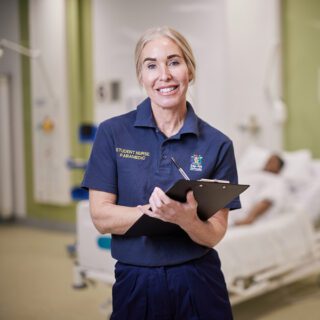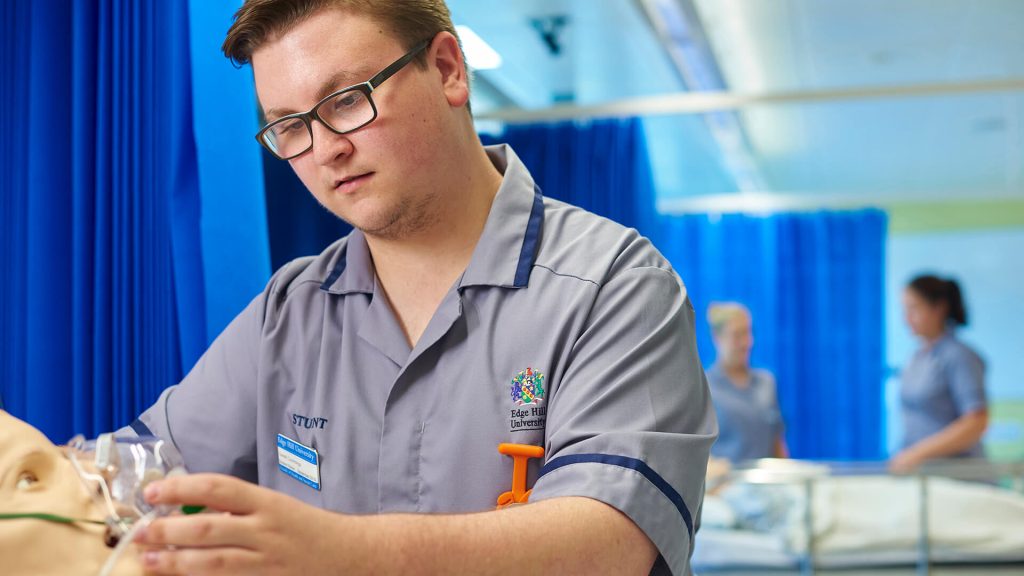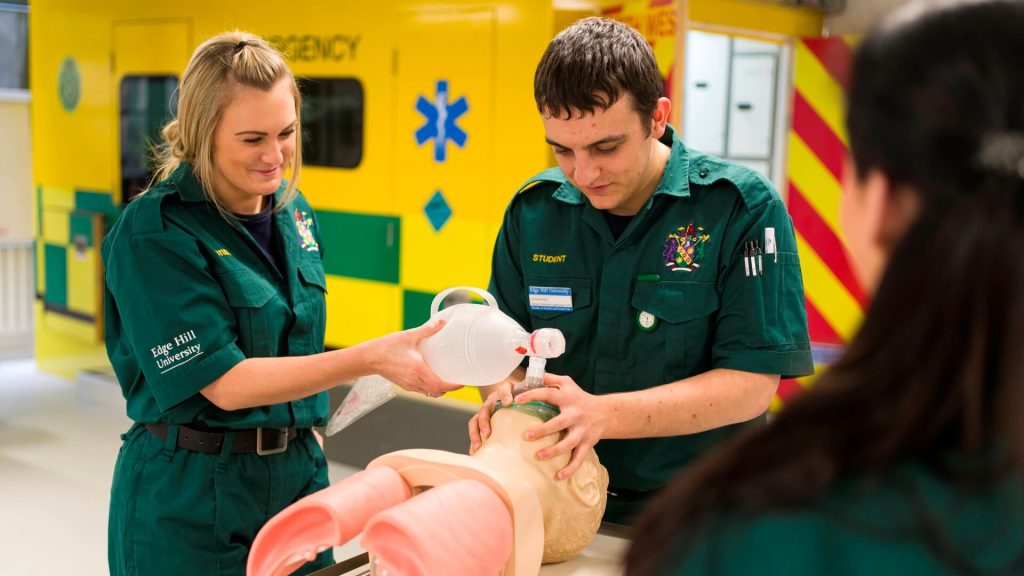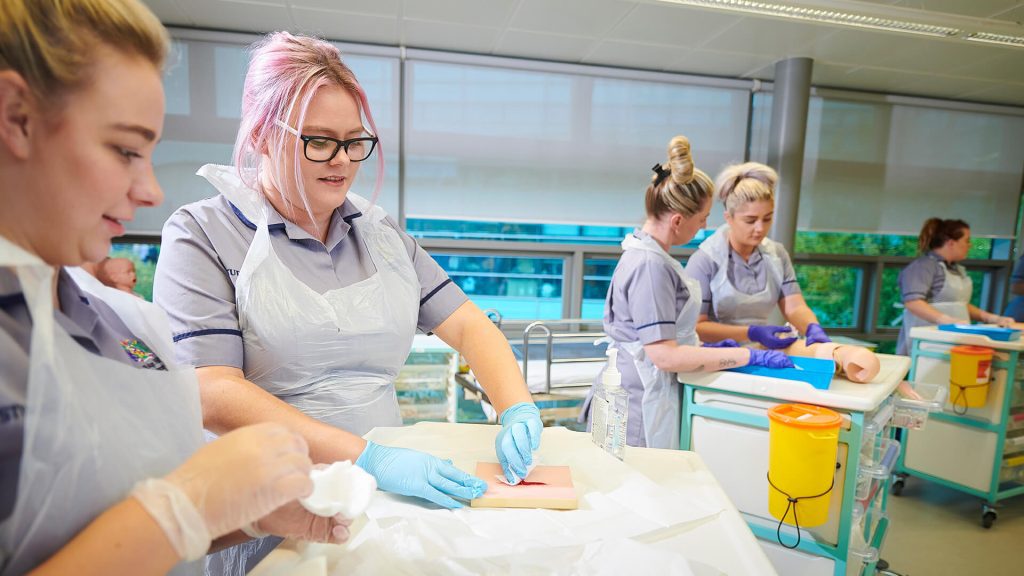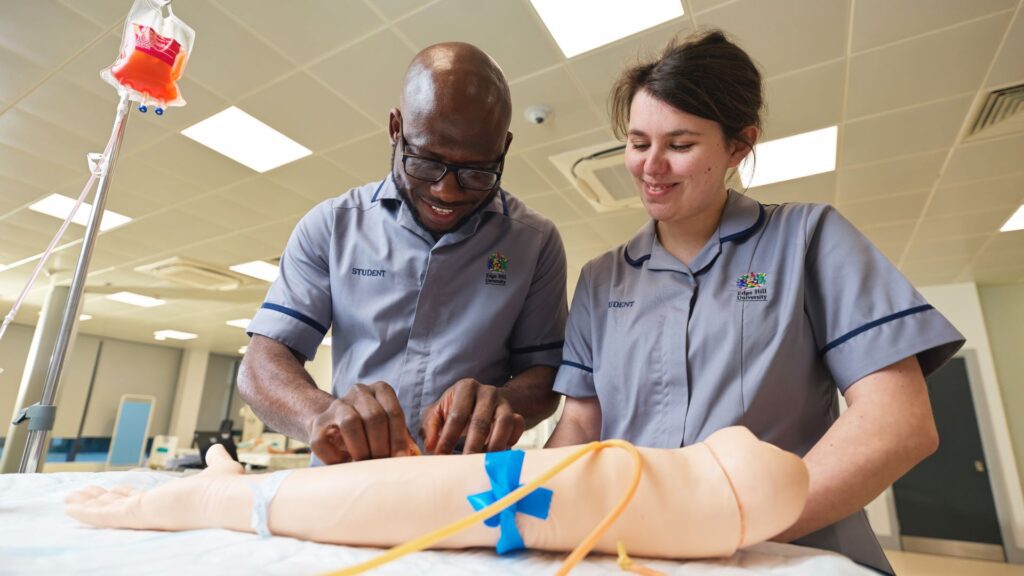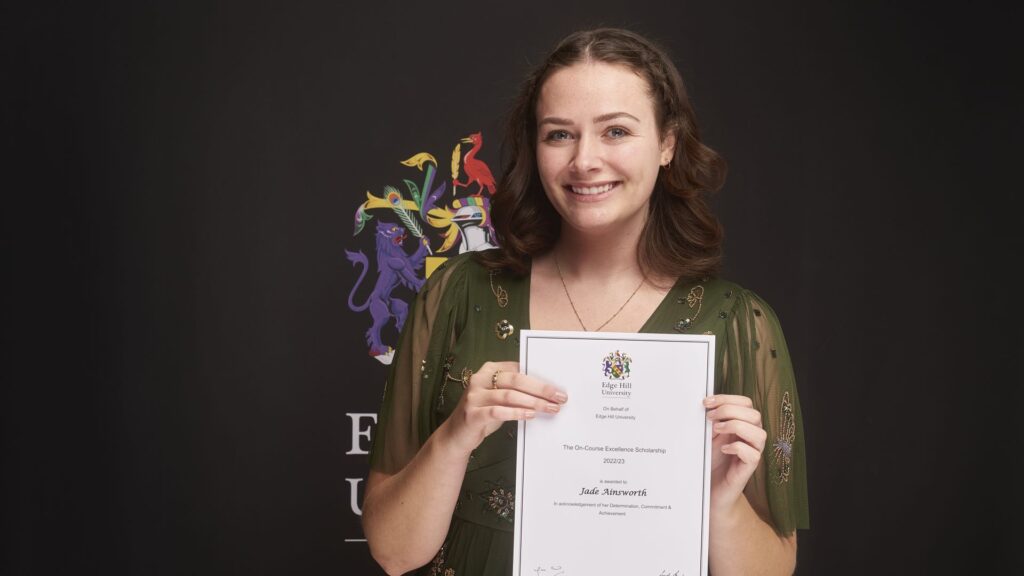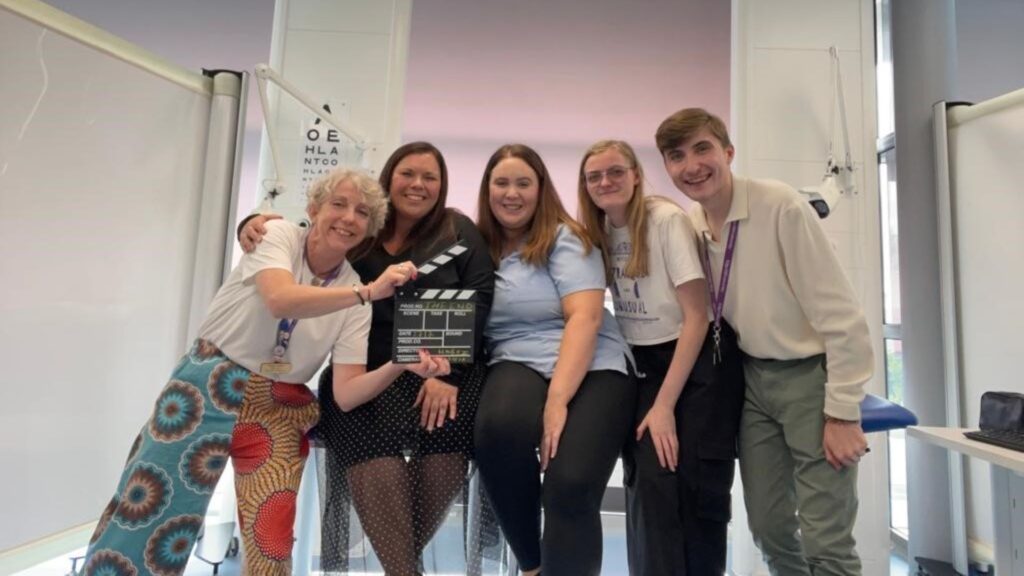Nurse Paramedic (Adult) MSci (Hons)
UCAS code: B795
Be at the forefront of integrated healthcare by combining nursing and paramedic practice. Gain eligibility to register as an adult nurse with the Nursing and Midwifery Council and as a paramedic with the Health and Care Professions Council.
Overview
| Course length: | 4 years full-time |
|---|---|
| Start dates: | September 2025 September 2026 |
| Location: | Edge Hill University (full-time) and St James’ (Manchester) (full-time) Edge Hill University (full-time) or St James’ (Manchester) (full-time) |
| Example offers: | BBB-ABB (A Level) or DDM (BTEC) View full entry criteria |
| Subject(s): | NursingParamedic Practice |
| Faculty: | Health, Social Care and Medicine |
| Department: | Nursing and Midwifery |
Want to kickstart a challenging healthcare career? Training as a nurse paramedic could be the perfect match for you. With this distinctive integrated Masters degree, you’ll become a versatile and dynamic practitioner with a focus on person-centred care.
Over four years, our compelling nurse paramedic integrated Masters degree will develop your critical decision-making and ability to work on your own. Delve into theoretical knowledge of anatomy and physiology of the human body, emergency care, and how to manage chronic and complex care.
The first and final years of the programme will be taught primarily at the Edge Hill’s Ormskirk campus, while years two and three are delivered at our St James’ site in central Manchester.
During each year of study you’ll complete placements in a variety of healthcare settings. Simulated learning supports your real-world experience to develop your knowledge and skills.
Please note: This is an undergraduate programme. It is not suitable for those who already hold a nursing (NMC) or paramedic (HCPC) registration as a qualified practitioner. The course is fully integrated from the outset, so existing practitioners with elements of knowledge in one area of practice only will be unable to join midway through, as they will miss core elements of the other role included within the programme content and delivery. Standalone modules are also unavailable on this course. However, if you already hold NMC or HCPC registration as a qualified practitioner, and are looking to upskill in a specific area, please consider our postgraduate provision.
An approved degree
On successfully graduating from this course at Edge Hill, you’ll be eligible to register as a qualified adult nurse with the Nursing and Midwifery Council. You’ll also qualify as a paramedic with eligibility to apply for registration with the Health and Care Professions Council.
 Health & Care Professions Council
Health & Care Professions Council
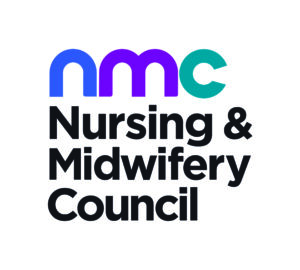 Nursing & Midwifery Council
Nursing & Midwifery Council
Course features
-
Professional accreditation
-
Professional practice placements
What you'll study
This course adheres closely to the six core values of the NHS. These values, enshrined within the NHS Constitution, have been developed by patients, the public and staff to inspire passion in the NHS, guide it in the 21st century, and provide common ground for cooperation in achieving shared aspirations.
Establish your identity as an integrated practitioner. We’ll introduce the factors that drive contemporary professional practice and look at patient care in a range of healthcare settings. Dive into anatomical and physiological theory and the processes associated with human function. You’ll also unpack how evidence can be applied to practice. Take part in full-day simulations where you’ll be immersed in a range of clinical scenarios.
During Year 2 of our nurse paramedic course you’ll enhance your abilities as you focus on a person-centred approach to care. Study what to do in emergency situations and consider the principles of planning specific care for patients of all ages. Your focus will be on common pathophysiological conditions and providing specific care to patients in any setting. You’ll also enhance your research skills in both traditional and non-traditional methods, and how you’ll use them as a nurse paramedic.
Dig deeper into care provision, specifically minor injury treatments, skin and wound care, triage and behavioural change. You’ll study how best to use these skills in primary care and alternative care settings. We’ll cover the impact of social and public health on care provision, then develop your awareness of law and ethics. You’ll get the chance to demonstrate decision-making and clinical judgement skills, then engage with audit and service improvement to become an autonomous practitioner.
The final year brings it all together. You’ll exhibit the skills, understanding and practice experience to become an autonomous practitioner. You’ll work with professionals, demonstrate clinical judgement and decision-making, and develop your awareness of investigation and diagnostic tools. Building on your time spent working in healthcare settings, the course culminates in a 12-week placement to support your transition into professional practice.
How you'll study
Years 1 and 4 of this programme are primarily delivered at Edge Hill University’s Ormskirk campus, however some sessions may also take place at Alder Hey Institute in the Park in which case you will be responsible for travel and parking costs. In Years 2 and 3 you will be based at our St James’ site in Manchester. You should be aware that you may incur additional travel costs due to the dual site delivery of this programme.
You will be taught through a combination of lectures, seminars, workshops, simulated practice, peer sessions, tutorials and scenario-based learning.
Placements will include weekends, early mornings, evenings and night work to ensure a full range of practice experiences. You will be responsible for travel and parking costs while on placement.
How you'll be assessed
You will be assessed through a variety of mechanisms, including written, oral and practical assessments, that are designed to evaluate your knowledge and assess your ability to apply this understanding to the professional standards and proficiencies.
Assessments vary from Dragons’ Den style presentations where you will engage stakeholders and academic staff in quality improvement ideas to a written exploration of a condition or disease of your choice.
Some assessments will be undertaken in practice settings, supported by qualified practitioners and academic staff.
Who will be teaching you
The programme team comprises research-active professionals within the field of nursing and registered paramedics. Most importantly service users, carers and their families will be involved in facilitating your learning so that you gain an understanding of the impact care has on individual groups.
Entry criteria
Typical offer 120-128 UCAS Tariff points, plus GCSE English Language and GCSE Mathematics at Grade C or Grade 4 or above (or equivalent).
Relevant natural and applied science subjects are preferred but not essential. An interview forms part of the selection process.
If you accept an offer from Edge Hill you will need to satisfy the requirements of the Nursing & Midwifery Council and Health and Care Professions Council in respect of physical and mental fitness and will be required to apply for a Disclosure and Barring Service (DBS) Enhanced Disclosure indicating that you meet the mandatory criteria of ‘Clearance to Work with Children and/or Vulnerable Adults’. Further information will be sent to you after you have firmly accepted an offer.
Example offers
| Qualification | Requirement |
|---|---|
| A Level | BBB-ABB. |
| BTEC Extended Diploma (or combination of BTEC QCF qualifications) | Distinction, Distinction, Merit (DDM). |
| T Level | Overall grade of Distinction. |
| International Baccalaureate (IB) | We are happy to accept IB qualifications which achieve the required number of UCAS Tariff points. |
| Access to Higher Education Diploma | 45 credits at Level 3, for example 24 credits at Distinction and 21 credits at Merit or 30 credits at Distinction and 15 credits at Merit. The required total can be attained from various credit combinations. |
Please note, the above examples may differ from actual offers made. A combination of A Level and BTEC awards may also be accepted.
If you have a minimum of two A Levels (or equivalent), there is no maximum number of qualifications that we will accept UCAS points from. This includes additional qualifications such as Extended Project Qualification (EPQ), AS Levels that haven't been continued to A Level, and General Studies AS or A Level awards.
Our new Fair Entry Criteria is a Contextual Admissions Policy that takes an applicant’s personal and educational background into account. This policy will allow eligible applicants to receive up to a two-grade reduction in their entry requirements for this course. Find out more and see if you qualify.
How to apply
Apply full-time
Read our guide to applying through UCAS to find out more about the application process.
International
EU/EEA and Swiss students who have settled or pre-settled status under the EU Settlement Scheme, as well as Irish nationals, are eligible to apply for this course.
Please note this course is not available to other international students. Please see our A-Z of courses for alternative options.
Please note, we do not accept deferred entry for this programme.
Should you accept an offer of a place to study with us and formally enrol as a student, you will be subject to the provisions of the regulations, rules, codes, conditions and policies which apply to our students. These are available at www.edgehill.ac.uk/studentterms.
If you join a full time undergraduate degree at Edge Hill University, we will guarantee you the offer of a room in our halls of residence for the first year of your course.
Discover our accommodation
Facilities

The Faculty of Health, Social Care and Medicine offers outstanding facilities for the education and training of health and social care professionals.
The contemporary teaching and learning resources include leading edge clinical skills facilities, an 860-seat lecture theatre, and a variety of teaching rooms and social learning spaces. An additional clinical skills suite is available at St James’ in Manchester, where there are also teaching rooms, an open plan library and IT facilities.
Where you'll study
Learning resources
The Clinical Skills and Simulation Centre offers a variety of simulated environments from home, through primary and emergency care, to secondary care and beyond. The flexible and adaptable facilities include a ward environment, operating theatre, an anatomy and ultrasound resource centre, a ‘Better at Home’ suite, clinical skills area and consultation rooms.
You will benefit from access to a wide variety of healthcare equipment, as well as a range of full-body patient simulators that can breathe, talk, have pulses and can simulate a wide range of symptoms and clinical conditions. This will enable you to undertake practical scenarios in realistic settings, providing ideal preparation for professional practice placements and future employment.
These facilities are complemented by the modern clinical skills facility at St James’ in Manchester city centre. This houses an extensive clinical simulation suite, including a mock operating theatre, simulated ambulance bay and clinical skills stations.
Finance
Tuition fees
UK Full-Time
£9,535
a year
EU/EEA and Swiss students who have settled or pre-settled status under the EU Settlement Scheme, as well as Irish nationals, may be eligible for the UK tuition fee rate.
Financial support
Students on this course may be entitled to the NHS Learner Support Fund if eligible. Visit the NHS Business Services Authority website for further information.
Please note that Student Finance's rules on previous study impacting eligibility for student funding do not currently apply to nurse paramedic students. For further information on these rules, please visit our previous study and equivalent and lower qualifications page.
Subject to eligibility, UK students joining this course can apply for a Tuition Fee Loan from the Government to cover the full cost of tuition fees. UK students enrolling on the course may also be eligible to apply for additional maintenance loan funding to help with living costs.
Scholarships
We offer a range of scholarships, which celebrate the determination, commitment and achievement of our students. Many of our scholarships are awarded automatically. There are some however, where you will need to be involved in an application or nomination process. To find out more about our scholarships and check your eligibility, please visit our dedicated scholarships pages.
Money Matters
Please view the relevant Money Matters guide for comprehensive information about the financial support available to eligible UK students, together with details of how to apply for potential funding.
EU/EEA and Swiss students who have settled or pre-settled status under the EU Settlement Scheme may be eligible to apply for financial support. Irish nationals can ordinarily apply to Student Universal Support Ireland (SUSI). Please see our EU student finance page for further details.
Your future career
Completing this nurse paramedic degree gives you excellent career prospects with a Masters level academic qualification and two professional awards. Once qualified as a fully integrated practitioner you’ll be at the forefront of future healthcare provision and this will help you to stand out to prospective employers.
Many graduates go on to work in a variety of hospital and community settings or urgent and emergency care in the dynamic areas of:
- Nurse paramedic
- Nursing
- Paramedicine
You’ll be eligible to apply for registration as an adult nurse with the Nursing and Midwifery Council, while also qualifying as a paramedic with eligibility to apply for registration with the Health and Care Professions Council.
Course changes
Every effort has been made to ensure the accuracy of this information, however our courses are subject to ongoing review and development. Changing circumstances may necessitate alteration to, or the cancellation of, courses.
Changes may be necessary to comply with the requirements of professional bodies, revisions to subject benchmarks statements, to keep courses updated and contemporary, or as a result of student feedback. We reserve the right to make variations if we consider such action to be necessary or in the best interests of students.

